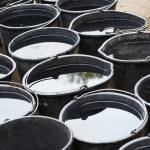How Do Various Supplements Affect Hydration and Metabolic Problems in Endurance Horses?

Water intake and supplementation with electrolytes is crucial in the prevention of dehydration and metabolic problems during endurance races.
This study was designed to test whether an experimental concentrate rich in fat and fiber (EF) and a potassium-free electrolyte mixture (EM-K) would have metabolic advantages in an 80-km race over an experimental concentrate rich in starch and sugar (ES) or commercial concentrates (CS) fed with or without commercial potassium-rich mixtures (EM+K).
In the study, 40 horses were weighed and blood samples were taken before, during, and after the ride.
The EM-K horses were less dehydrated than EM+K horses indicated by the lower plasma albumin and total protein at 80 km and after the race. Higher plasma sodium at 80 km and after the race would attract more water into the circulating blood, and these shifts help to maintain plasma volume and blood pressure. The lower plasma potassium found in the EM-K group and the higher calcium in the ES and EF supplemented horses may help prevent increases in neuromuscular excitability and related clinical signs. Less dehydration in the EM-K group would help maintain temperature regulation and delay fatigue.
This report of KER’s 2003 research was published in Proceedings of the 18th Equine Nutrition and Physiology Society Symposium.
Read the entire research paper, titled Potassium-Free Electrolytes and Calcium Supplementation in an Endurance Race.








